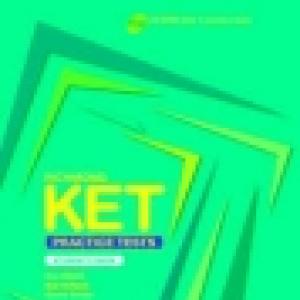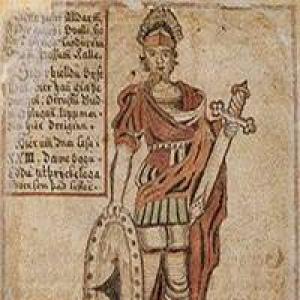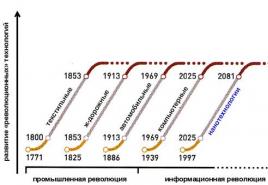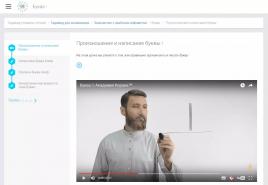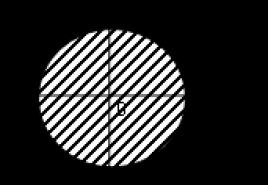Individual self-education plan for a teacher according to the Federal State Educational Standard. Individual self-education plan
Nowadays, one of the main components of the professional competence of preschool teachers is self-education. How does it happen?
The need for professional growth
Realizing the imperfection of knowledge and skills in professional activity, the teacher receives a powerful incentive to professional growth, deepening knowledge and mastering new methods of educational activities.
How and in what way can the process of professional development be organized?
In order to be in trend, a modern educator needs to systematically follow news in the field of preschool pedagogy and psychology, become familiar with advanced pedagogical experiences, be in constant communication with colleagues, work to increase general erudition and improve pedagogical excellence, get acquainted with the regulatory framework preschool education and analyze your own professional experience.
Additional teacher development is a mandatory part that is included in the self-education plan preschool teacher according to the Federal State Educational Standard. The plan helps to systematize the work, is a reflection of the effectiveness of the teacher’s activities, and creates opportunities for prospects for communication with children.

Drawing up a self-education plan: stages
Let's look at a few points that you need to pay attention to. The self-education plan for a preschool teacher according to the Federal State Educational Standard can be drawn up taking into account the following factors:
- justification for choosing the topic;
- the relationship between the topic of work and the goals and objectives of the preschool institution;
- preliminary work, including the study of methods and programs for preschool education and upbringing;
- choosing forms of interaction with preschoolers;
- own methods;
- expected result of working on the topic;
- conclusions and dynamic statistics of child development;
- prospects for improving performance;
- results of self-education.
The self-education plan for a preschool teacher according to the Federal State Educational Standard requires careful preparation, during which a lot of questions arise. The main issue is the choice of topic. A methodologist or senior educator mainly helps with this, but the teacher can also make an independent choice, depending on the relevance and practical significance topics of educational activities.

In determining their readiness for self-education, young specialists are also recommended to familiarize themselves with the map of G. M. Kodzhaspirova. The self-education plan for a preschool teacher according to the Federal State Educational Standard must be drawn up taking into account the following recommendations:
- When studying any issue, you need to research several sources in order to form your opinion.
- It is advisable to work with library catalogs and material from the Internet in order to obtain the necessary literary source.
- When searching for material, it is important to focus on innovative methods in education.
- Communication and exchange of experience with colleagues - important point teacher self-education.
An individual self-education plan is drawn up in two types:
- Annual planning
- Long-term planning, which provides for annual revision of the educational activity plan

If an individual self-education plan is drawn up according to the second type of planning, you can use the project method appropriate to the age of the children. Long-term planning must necessarily include current issues preschool education in dynamic development.
Approximate list of topics for teacher self-education according to the Federal State Educational Standard
The teacher can choose the following topics provided for by the Federal State Educational Standard for preschool education:
- Amplification methods for the development of preschool children.
- Features of pedagogical diagnostics in preschool educational institutions.
- Method of individual approach in preschool education.
- Methodology for the formation of life safety.
- Emotional intelligence of a preschooler.
- Methods for guiding gaming activities.
- Formation of local history ideas (small homeland).
- Creative abilities of preschoolers.
- Preparation for educational activities.
- Developing curiosity.
- Familiarization with objects of the surrounding world.
- Spiritual and moral education of preschool children.
- Formation of EMF.
- Development of sociability.
- Coherent speech.
- Elementary analysis of a literary work.
- Literacy training.
- The use of non-traditional artistic techniques.
- Basics of healthy lifestyle in preschool educational institutions.
- Formation of CGN and self-service skills.
- Ensuring psychological comfort in a child care facility.
- Information and communication technologies in educational institutions.
- Continuity between kindergarten and school.
- Psychological and pedagogical support for families.
- Fundamentals of inclusive education in preschool educational institutions.
- RPPS kindergarten.
- Partial programs of preschool educational institutions.
- Innovative forms of interaction with parents.
- Organization of experimental activities.
- Quality and evaluation criteria for educational institutions.
Organization of work by topic
Each topic requires analytical work. When analyzing literature, the teacher must highlight the main thoughts and ideas of the authors in order to determine the direction of work on this topic. For example, if the topic “Spiritual and moral education of preschool children” is chosen, the teacher needs to pay special attention to the methods of organization and general content work on this topic in various age groups of kindergarten.
One of current issues education in kindergarten is environmental education. How to draw up a self-education plan for a preschool teacher according to the Federal State Educational Standard? Ecology, for example, should include classes and conversations to familiarize oneself with the nature of one’s native land, experimental activities, and work with parents to promote the development of environmental knowledge in preschool children.

Teacher self-education plan Preschool junior group should cover work on assessing capabilities, physiological and psychological characteristics children of this age category, indicate the range of problems related to working with younger preschoolers, include the use of interactive teaching methods and modern techniques early development. Work on the topic can be carried out with the participation of several teachers who are directly familiar with the tasks and goals of the preschool educational institution. A properly organized process of self-education provides great opportunities for deeper personal development and effectively improving the professional competence of a teacher.
Good afternoon, dear guests of my pedagogical page! Tatyana Sukhikh is back on air! I remember myself in the first year of working as a teacher. It was difficult, to be honest. The constant continuous writing was especially annoying. I want to help my young colleagues, show how you can simplify your teaching life, so to speak. Today I’ll tell you what a teacher’s self-education plan is and how to draw it up.
I have already touched on the topic of self-education several times on the pages of the blog, but I haven’t talked about the plan yet. Whatever one may say, at the beginning of each school year all educators must choose and approve this very plan. We choose a topic in accordance with the plan preschool work, as well as with an individual work plan for the year.
That is, if your topic is development fine motor skills through finger theater, then all year according to plan you must definitely implement your theme with the children. Here we are all school period We record the stages of self-education in a special notebook, where we note everything that has been done specifically on the topic.
What does self-education work include:
- Studying thematic literature (we carefully record all authors and the titles of their works);
- Attending seminars, participating in webinars, courses, lectures, etc.;
- Conducting open classes for colleagues, giving reports, abstracts, consulting on the topic of self-education for parents and colleagues;
- Practical activities with children: classes, clubs, diagnostics, holidays, matinees, etc.
By the end of the school year, we will definitely write a report on self-education and present it at pedagogical council. Certification will also not go smoothly without high-quality materials on the work done. If you approach the question not as an obligation, but as an opportunity to deepen your knowledge and acquire new skills, then the process self-study will captivate you. Look, there’s enough material for the author’s manual!
After all, for modern teacher the desire for self-improvement should be natural. We have no right to be ossified, old testament or something. Our children constantly baffle us, so finding new forms of education and development for modern preschoolers is our first task. And for this you need to study, study...

Moreover, in modern world information loses its relevance after 5 years. This is what the statistics say. In total, the knowledge that was put into our heads at school or institute is outdated...
So that you don’t have to search for topical materials for a long time, I took on this work.
Online store "UchMag" - first aid
Kindergarten is a platform for preparing children for a complex life during the school period, when life position and the identity of the citizen. I would like to note that, despite my sometimes humorous and not entirely scientific language presented in the articles, I, as a teacher, am fully aware of the responsibility that lies with me. What I will give to each pupil today is what he will go to first grade with.
Teachers will thank me primary school or scold, depends on my competence and interest in the effectiveness of the efforts made. Therefore, I ask young colleagues not to consider work planning, including self-education, as an unnecessary waste of time for anyone, and unsubscribes for superiors. We work not on our own, not as a private shop, but as representatives state system education.
It may not be perfect, but there is no other. In connection with the above, I propose that we take seriously the development of an individual work plan and try to ensure that it reflects our desire to give children solid luggage for the difficult journey from childhood to adolescence. Eh, how did I screw it up?
So, I won’t be an unfounded moralist, but I will help my young colleagues practical advice: buy a manual at UchMag “Teacher’s work program: daily planning according to the program “From birth to school”(edited by Veraksa N.E. et al.). Attached to it daily planning. Available separately work program middle group (4-5 years), senior group(5-6 years) and preparatory group(6-7 years old).

The Federal State Educational Standard is very strict in matters of planning activities, but this particular program is fully approved and recommended by everyone in our education system. By the way, there is a ready-made one here rough plan self-education.
Making a plan for self-education: step-by-step instructions
How to properly draw up a work plan for self-improvement:
- We design the title page according to well-known canons; you can simply download it on the Internet. But be sure to indicate the name of the preschool institution, write that this is a plan for self-education of such and such a teacher (full name, experience, category), write down the topic, period of work (from September 2017 to May 2017) and the age group of children;
- Next pages: topic, goal, tasks. We know the topic, the goal comes directly from the topic. The tasks are as follows: to increase the level of knowledge on the issue by studying relevant literature, attending training seminars, and independent research work.
The tasks also include developing a long-term work plan in accordance with the topic of self-education, preparing diagnostics at the beginning and end of the year, creating curriculum, organizing a circle for children and other practical activities that you plan to carry out. This could also be the design of a corner, holding consultations, a seminar, a lecture.
- Expected results for self-education. We write them based on the tasks. We just use different words and add about the children’s achievements.
- Specific stages of self-education work. A table is appropriate here: we break it down by month of the school year, distribute work with children, parents, colleagues, independent work. We write down everything we will do and spend
Individual plan for self-education
for 2013-2014 academic year. Kuznetsova Elena Anatolyevna
Subject: "Development cognitive activity in preschool children ».
Target : Increasing competence on the problem of organizing the educational process, taking into account updating the content of preschool education
Relevance of the topic: The baby is a natural explorer of the world around him. The world opens up to the child through the experience of his personal feelings, actions, and experiences. “The more a child has seen, heard and experienced, the more he knows and has learned, the more elements of reality he has in his experience, the more significant and productive, other things being equal, his creative and research activities will be,” wrote the classic of Russian literature. psychological science Lev Semyonovich Vygodsky The development of the cognitive interests of preschool children is one of the pressing problems of pedagogy, designed to educate a person capable of self-development and self-improvement. The development of cognitive activity in preschool children is especially relevant in modern stage, since it develops children's curiosity, an inquisitive mind and forms stable cognitive interests on their basis.
Tasks:
Creating conditions for creative and cognitive activity of children;
Organization individual activities on comprehension and elaboration of given material;
Studying methods, technologies for the development of creativity cognitive abilities preschooler.
Expected results Increasing competence in the subject. Collection of educational games, publications on the problem, replenishment of the “Treasury of Developments and Experience” Selection practical material(system of exercises, games, audio-video materials
Subject
Literature used
Report form
Date
Study of regulatory documents regulating the activities of preschool classes
documents of the Ministry of Education of the Republic of Kazakhstan, Internet resources
September 2013
Organization of educational process
documents of the Ministry of Education of the Republic of Kazakhstan for the development of working materials
in all subjects
Schedules
September 2013
Educational games as a means of developing the cognitive abilities of preschool children.
– development tool creative potential personality of a preschool child.
Internet resources
Collection of educational games.
October-November 2013
Solving problem situations
Collection of works “Development of independence and activity in preschool age».
December 2013
Creating a subject-development environment
Studying the organizational conditions for the developmental activities of children in a group.
Consultation for parents on the topic: “Creating conditions for developmental activities.”
January 2014
Online exchange of best practices
Exchange of experience on the sites “Self-education in the formation of cognitive abilities of preschool children.”
Publications on websites
February 2014
Educational children's activities in unorganized forms of activity Formation of artistic and speech development of children through joint theatrical activities of children and parents
Carrying out the "Mother's Day"
March 2014
"Step by step"
Creation of a “Treasury of Experience and Best Practices”
Teacher's folders
April 2014
New approaches in preschool education
Generalization of experience on innovative technologies V educational process
Round table of preschool teachers
May 2014
Municipal budget preschool educational institution kindergarten No. 8 in Rostov-on-Don
TEACHER'S FOLDER
ON SELF-EDUCATION
Mogilina Alena Alexandrovna
(Full name)
teacher
(Job title )
Subject:
"Game activity of preschool children."
GENERAL INFORMATION ON THE TOPIC OF SELF-EDUCATION.
Subject : Play activities of preschool children.
Relevance of the topic:
The main activity of preschool children is play. During the game, the child’s spiritual and physical strengths develop: his attention, memory, imagination, discipline, dexterity, etc. In addition, play is a unique way of learning social experience, characteristic of preschool age.
In the game, all aspects of the child’s personality are formed, significant changes occur in his psyche, preparing the transition to a new, higher stage of development. This explains the enormous educational potential of play, which psychologists consider the leading activity of a preschooler. A game for preschoolers is a way of learning about their surroundings. While playing, he studies colors, shapes, properties of materials, plants, and animals. Through play, a child enters the world of adults, masters spiritual values, and assimilates previous social experience. In the game, the child receives for the first time a lesson in collective thinking.
The purpose of self-education:
Increasing pedagogical competence.
Tasks:
through play activities.
activity.
play activity.
PERSONAL PERSPECTIVE PLAN
ON SELF-EDUCATION
Working with documentation.Study of the Law “On Education”, others regulatory documents
Acquaintance and analysis of documentation.
Increasing pedagogical competence
Planning work with children for the new school year.
Studying literature on the problem, creating a work plan.
Increase the level of pedagogical knowledge.
Material selection
Publication of material
“Consultation for educators. Development of play activity of preschool children"
Studying literature on the topic.
Material selection
Exchange of experience on the problem.
October
Development didactic material felt for play
"Pets"
Internet resources
Through play, explore body parts and methods of movement. Who eats what and how they speak. Word formation (call it affectionately, one-many, etc.). Composing phrases, sentences, stories.
November
O.A. Stepanova “Development of a child’s play activity”
Introduction to literature.
Analysis and consideration of play as a form of organizing the life activities of preschool children
Development of a didactic game on healthy lifestyle
"Be healthy"
Selection of material on the topic.
Internet resources.
Study, develop and enrich children's gaming experience
December
Making a didactic game “Food”
Internet resources
Development of play activities of preschoolers
Working on the topic
"Classification of theatrical games"
Selection of material on the topic.
Through various forms of theatrical play, improve moral and communicative qualities, creativity, mental processes.
January
Working on creating methodological folders.
Selection of material.
Gaining experience
Development of a game project for a role-playing game
"Children's cafe"
Internet resources
To develop in children the ability to play the role-playing game “Children's Cafe”.
February
Development of the developmental manual “Seasons: Tree”
Selection of material.
Internet resources.
Familiarizing children with seasonal changes in nature, consolidating counting, number composition, color, developing fine motor skills
Card index development
"Games for children's team building"
Material selection
Learn to establish trusting contact with each other, provide mutual assistance, and listen to your partner’s opinion.
March
Studying methodological literature
“Fun games in the kindergarten area”
Reading literature, selecting material.
To form a system of consciously correct ecological ideas about nature.
Working on a catalog of games based on FEMP
Material selection
Development of intellectual abilities.
April
Development of a didactic game made from felt “Space”
Internet resources
To consolidate and systematize children’s ideas about space, devices for its exploration and astronauts
Development of card files:
outdoor games;
role-playing games;
finger games;
didactic games.
Material selection
Comprehensive development of the child
May
Working on a card index didactic games on patriotic education
To form an idea of state symbols, the world around us, and our small homeland.
Developing a self-education plan for the new academic year.
Selection of methodological literature
Report on the topic of self-education.
Topic: Play activities of preschool children.
I decided to take the topic of self-education “Game activities of preschoolers under the conditions of the introduction of the Federal State Educational Standard for preschool education.” I started my work on the topic from senior preschool age.
I made a personal long-term plan for self-education.
I studied the regulatory documents:
Letter of the Ministry of Education of the Russian Federation dated May 17, 1995 No. 61/19-12 “On psychological and pedagogical requirements for games and toys in modern conditions"(Text of the document as of July 2011)
Letter of the Ministry of Education of the Russian Federation dated March 15, 2004 No. 03-51-46in/14-03 “Approximate requirements for the maintenance of the developmental environment for preschool children raised in a family”
Federal Law of the Russian Federation of December 29, 2010 No. 436-FZ “On the protection of children from information harmful to their health and development” (as amended by Federal Law of July 28, 2012 No. 139-FZ)
Order of the Ministry of Education and Science of Russia dated October 17, 2013 No. 1155 “On approval of the federal state educational standard for preschool education.” Registered with the Ministry of Justice of the Russian Federation dated November 14, 2013 No. 30384
Resolution of the Chief State Sanitary Doctor of the Russian Federation dated May 15, 2013 No. 26 “On approval of SanPiN 2.4.1.3049-13 “Sanitary and epidemiological requirements for the design, content and organization of the operating mode of preschool educational organizations”
I studied methodological literature on this topic.
O.A. Stepanova “Development of a child’s play activity.”
“Fun games in the kindergarten area.”
V.A. Derkunskaya “Games-experiments with preschoolers.”
V.A. Derkunskaya, A.G. Ryndin “Game techniques and communication games
for children of senior preschool age."
O.A. Skorlupova, L.V. Loginova. Pedagogical guidance of children's games
preschool age.
O.V. Dybina. “Game technologies for introducing preschoolers to
objective world."
N. Lunina. "We play with letters and words."
E. Volkova “Playing Scientists.”
Defined:
1.
game implementation factors:
- establishing a meaningful connection between children’s knowledge about the surrounding reality (the content of the cognitive sphere) and their play;
Inclusion of all types of games in the pedagogical process;
Timely organization of a developing subject-game environment;
Qualified participation of teachers in pedagogical process ensuring the child’s right to play;
Individual approach to the upbringing, training, development of children in play activities;
Long-term planning for game development (integrated method);
Using effective methods and techniques to promote game development
2.
conditions for the effectiveness of game development:
- free and voluntary inclusion of children in the game;
Children must understand well the meaning and content of the game, its rules,
the idea of each game role;
The game should have a positive impact on all areas of its participants;
Sufficient time to play and availability of necessary
toys for the implementation of children's plans;
When creating a play environment, the gender differences of children should be taken into account;
Carry out timely changes to the gaming environment, taking into account
enriching life and play experiences of children and in accordance with their
interests, mood
3. targets for the Federal State Educational Standards
The child shows initiative and independence in... play... Is able to choose his own occupation, participants in joint activities, and demonstrates the ability to implement various ideas;
-...Actively interacts with peers and adults, participates in joint games. Able to negotiate, take into account the interests and feelings of others, empathize with failures and rejoice in the successes of others, try to resolve conflicts;
The child has a developed imagination, which is realized in different types activities. The child’s ability for fantasy, imagination, and creativity intensively develops and manifests itself in play.
The child knows different forms and types of play. Knows how to obey different rules and social norms, distinguish between conditional and real situations, including gaming and educational situations;
Can fantasize out loud, play with sounds and words.
In my work I used the exchange of experience on this topic with other teachers
.
To do this, I registered on the sites
:
http://pedrazvitie.ru
http://www.maam.ru
She took part in the competition “Game activity of preschoolers”.
For the practical part I set the following tasks:
-
Determining the role of play in organizing children's life activities.
Development of intellectual abilities in children through
application of gaming technologies.
- Creating conditions for psychological and physical health
through play activities.
- Creating conditions for emotional well-being through gaming
activity.
- Actively influence the comprehensive development of children through
gaming activity.
In order to study and enrich the experience of children, she created didactic manuals:
educational material made of felt for the game “Pets”;
didactic game on healthy lifestyle “Be Healthy”;
didactic game “Food”;
didactic game "Space";
Didactic manual “Road signs”
Development of a developmental manual “Seasons: Tree”;
Development of a game project for a role-playing game “Children's Cafe”.
In order to develop the play activity of preschoolers, I used these manuals in the game.
To gain experience, I worked on creating methodological folders:
outdoor games;
role-playing games;
finger games;
didactic games;
didactic games for patriotic education;
card index of games for FEMP;
games for children's team building;
classification of theatrical games.
Working on this topic of self-education, I made the following conclusions:
Play is a unique way of learning social experience, characteristic of preschool age.
The game is designed to solve general educational problems, among which the tasks of forming the moral and social qualities of the child are of primary importance.
Play in older preschool age should be of an amateur nature and increasingly develop in this direction, subject to proper pedagogical guidance.
An important feature of play as a form of children’s life activity is its penetration into various types of activities: work and play, educational activities and play, everyday household activities associated with the implementation of the regime, and play.
Play is the most favorite and natural activity of preschoolers. Our task is to make play the content of children's lives, to reveal to children the diversity of the world of play.
Children's learning is most successfully accomplished through play, which is why play is the main form and content of classes.
But this does not mean that classes should be conducted only in the form of games. Training requires the use of a variety of methods. The game is one of them, and it gives good results only in combination with other methods: observations, conversations, reading, etc.
An interesting game increases the child’s mental activity, and he can solve a more difficult problem than in class.
So the game belongs big role in the life and development of children. Many positive qualities child's interest and readiness for the upcoming learning, his intellectual abilities. The game reflects and develops the knowledge and skills acquired in the classroom, and reinforces the rules of behavior that children are taught to follow in life.
Using play as a form of organizing children's lives, we will try to ensure that this life is interesting, meaningful, and easy for the entire children's team. So that it contains situations that encourage children to be more tall shapes social behavior and feelings. The value of the game lies not only in the fact that it expands the possibilities of knowledge of the spheres of reality, but also prepares the younger generation for life in society
The game itself is a universal stimulator.
The main thing in maintaining gaming interest is the sensitivity and observation of the teacher, the manifestation of a creative approach in organizing the game, and the ability to interest the child in the game plot.
Making a plan
self-education of a teacher.
The system of work of teachers for self-education:
At the beginning of the school year, each teacher develops an individual work plan for the school year in accordance with the chosen topic of self-education and the annual work plan of the preschool educational institution. Together with the senior teacher, report forms on this topic are selected. During the year, teachers record their work on self-education in a self-education notebook (or printed sheets recording the activities carried out...).
During the academic year, preschool teachers, following their self-education plan, work on the chosen topic:
- Study the necessary literature.
- They attend RMOs to gain work experience.
- They speak at teacher councils, seminars, conduct consultations for colleagues, and master classes.
- They conduct additional work with children: diagnostics of children’s knowledge, skills and abilities on their topic at the beginning and end of the school year, classes, conversations, holidays and entertainment, exhibitions of children’s work, and clubs.
At the end of the school year, all teachers draw up a report on the work done on the topic of self-education and present it at the final teacher council.
1 page – Title page:
MBDOU No. 10-TsRR-D/S
“Teacher self-education plan”
(Full name of teacher)
___________ _______________
Topic: "_______________________________"
(topic name)
________________
(academic year)
________________
(age group)
Artistic design of the self-education plan is allowed, taking into account these requirements.
Page 2 –
Topic: "..."
Target: "…"
Tasks:
- Increase your own level of knowledge by...(studying the necessary literature, visiting GMOs, self-education...)
- Develop a long-term plan for working with children
- Prepare diagnostics for the beginning and end of the school year
- Organize the work of the circle, create a curriculum.
- Create a corner in the group.....
- Prepare (conduct) a consultation for teachers on the topic “...”, a speech at the pedagogical council No.... on the topic “...”,
- Prepare (take part) in the seminar…..
- Prepare material (conduct) a master class for teachers on the topic: “”
|
Month |
Forms of work |
|||
|
With children |
Teachers |
Self-education |
Parents |
|
|
September |
Diagnosis of children's neurodevelopmental disorders |
Organize the work of the circle, create a curriculum, Literature Study |
||
|
October |
classes, conversations in accordance with the work plan of the circle |
|||
|
November |
||||
|
December |
Create a corner in the group..... |
Design of the transfer folder. Topic: "..." |
||
|
January |
||||
|
February |
Prepare (conduct) a master class for teachers on the topic: “...” |
|||
|
March |
||||
|
April |
Entertainment "..." |
|||
|
May |
diagnostics |
Writing a report on the work done during the academic year and presenting it at the teachers' meeting. |
Speech at parent meeting with a report on the work done for the academic year |
|
|
June |
exhibition of children's works |
Organize the work of the circle for the next academic year, create a curriculum |
Consultation for parents: "..." |
|
|
July |
||||
|
August |
||||
Theme output:
ü Carrying out open class. (collective viewing...) Topic: "..." (month)
ü Prepare (participate, conduct) a seminar. Topic: "..." (month)
ü Conduct a master class for teachers on the topic: “...”
ü Design of the transfer folder. Topic: "..." (month)
ü Collection of consultations for parents. Topic "..."
ü Report on the work done for the academic year.
Literature:
MBDOU No. 10-TsRR-D/S
"Notebook for self-education"
_________________________________
(Full name of teacher)
___________ _______________
________________
(started with...)
1 page –
Self-education topic: "..." ( academic year ), (age group)
You can write it in table form:
|
Forms of work |
|||
|
With children |
With teachers |
Self-education |
With parents |
|
September |
|||
You can fill out the notebook in free form, taking into account the proposed forms of work.
Requirements for self-education teachers in preparation for certification:
ü Work on the topic of self-education for at least 1 year;
ü Studying scientific and methodological literature;
ü Development long-term plans, lesson notes on the topic;
ü Creation of a modern subject-development environment in the group;
ü Carrying out diagnostics on mastering the program for this section;
ü Acquaintance with advanced pedagogical experience in the region, city;
ü Conducting open screenings at preschool educational institutions or at the district level;
ü Training in advanced training courses;
ü Giving a report on work experience at the teachers' council, participating in seminars and consultations;
ü Active participation in work methodological unification district;
ü Participation in pedagogical excellence competitions in preschool educational institutions and the region;
ü Generalization of work experience on the topic of self-education.
Memo for analyzing the self-education process:
- Did the plan pay off? How it was combined with the tasks of the preschool educational institution and the individual topic of self-education. Was the research work planned?
- Whose teaching experience and on what issues was studied in accordance with the individual topic of self-education. Stages of material development. What literature was studied: psychological, pedagogical, scientific, etc.
- Practical conclusions after studying a specific topic (thesis, reports, etc.)
- Creative collaboration (with a teacher, methodologist...)
- A list of questions that turned out to be difficult in the process of studying literature and work experience. Setting new tasks.
Long-term plan for teacher self-education.
Full name _____________________________________
Group______________________________ Work experience______________
Academic year |
Self-education topic |
Report form and deadline |
Date of completion "____" ___________________ 200 ____ year

